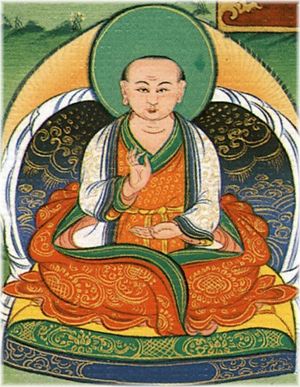The Great History: Difference between revisions
Jump to navigation
Jump to search
No edit summary |
(Tibetan.) |
||
| (2 intermediate revisions by one other user not shown) | |||
| Line 1: | Line 1: | ||
'''The Great History''' ([[Wyl.]] ''lo rgyus chen mo'', ''rdzogs pa chen po snying thig gi lo rgyus chen mo'') — a history written by [[Shyangtön Tashi Dorje]] (1097-1164), of the early [[Dzogchen]] masters and the transmission of the [[Mengakdé]] section of [[Dzogchen]] from Buddha [[Samantabhadra]], through the Indian [[vidyadhara]] masters, to [[Vimalamitra]] and the Tibetan lineage holders. It is contained within the [[Vima Nyingtik]] collection. | [[Image:Gyalwa Zhang.jpg|thumb|[[Shyangtön Tashi Dorje]]]] | ||
'''The Great History''' (Tib. ལོ་རྒྱུས་ཆེན་མོ་, རྫོགས་པ་ཆེན་པོ་སྙིང་ཐིག་གི་ལོ་རྒྱུས་ཆེན་མོ་, [[Wyl.]] ''lo rgyus chen mo'', ''rdzogs pa chen po snying thig gi lo rgyus chen mo'') — a history written by [[Shyangtön Tashi Dorje]] (1097-1164), of the early [[Dzogchen]] masters and the transmission of the [[Mengakdé]] section of [[Dzogchen]] from Buddha [[Samantabhadra]], through the Indian [[vidyadhara]] masters, to [[Vimalamitra]] and the Tibetan lineage holders. It is contained within the [[Vima Nyingtik]] collection. | |||
==Further Reading== | |||
*Dan Martin, ''Tibetan Histories: A Bibliography of Tibetan-Language Historical Works'', London: Serindia, 1997, p.28 | |||
[[Category:Texts]] | [[Category:Texts]] | ||
Latest revision as of 22:14, 3 August 2018

The Great History (Tib. ལོ་རྒྱུས་ཆེན་མོ་, རྫོགས་པ་ཆེན་པོ་སྙིང་ཐིག་གི་ལོ་རྒྱུས་ཆེན་མོ་, Wyl. lo rgyus chen mo, rdzogs pa chen po snying thig gi lo rgyus chen mo) — a history written by Shyangtön Tashi Dorje (1097-1164), of the early Dzogchen masters and the transmission of the Mengakdé section of Dzogchen from Buddha Samantabhadra, through the Indian vidyadhara masters, to Vimalamitra and the Tibetan lineage holders. It is contained within the Vima Nyingtik collection.
Further Reading
- Dan Martin, Tibetan Histories: A Bibliography of Tibetan-Language Historical Works, London: Serindia, 1997, p.28